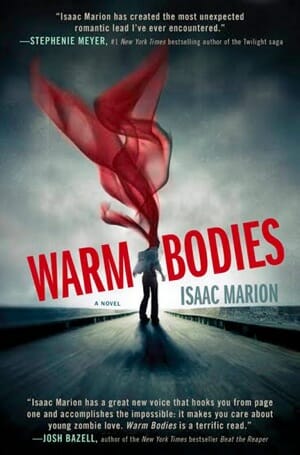Warm Bodies by Isaac Marion

The portrait of a zombie as a young man
One night, after watching an episode of Frank Darabont’s Walking Dead, I dreamt that my daughter had been bitten. Her infection was only partial—and included a predilection to nip at her siblings—but we were determined to keep her alive, find a cure, keep her soul intact.
The zombie threat is an idea that won’t go away—a monster who not only eats our flesh but robs us of our character, our brains, our essence. Worse than the death of the body is the thievery of the soul, leaving behind a morally bankrupt shell governed by our basest instict—the need to feed.
-

-

-

-

-

-

-

-

-

-

-

-

-

-

-

-

-

-

-

-

-

-

-

-

-

-

-

-

-

-

-

-

-

-

-

-

-

-

-

-








































